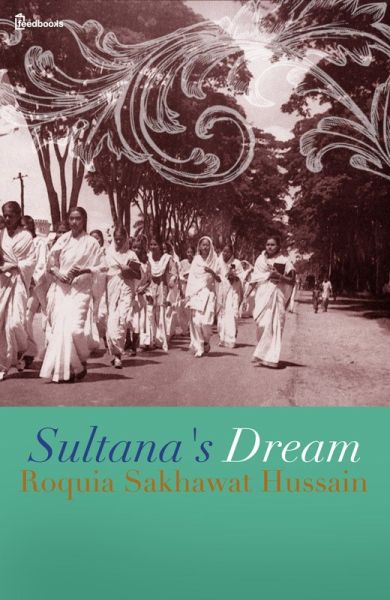Through the Dark, Through the Door
Sultana’s Dream
By Rokeya Sakhawat Hossain

27 Aug, 2019
Rokeya Sakhawat Hossain’s 1905 Sultana’s Dream is a feminist utopian novella. It was originally published in The Indian Ladies Journal.
A sultana muses on the condition of women in Calcutta, the city in which she lives. When a woman she takes for an old friend invites her for a walk, the sultana goes with her. It soon becomes clear the sultana has misunderstood the situation.
Through means unexplained, she has travelled to Ladyland, a futuristic Indian nation. Ladyland is arranged along lines that both resemble and differ from the sultana’s native culture. As propriety and reason require, one sex is carefully sequestered to protect society and to spare the persons involved exposure to activities for which their inherent characteristics make them unsuited. Where the sultana’s people confine women, however, Ladyland prefers to squirrel away their men.
The sultana’s surprise sparks a rambling conversation expounding on history, technology, urban design, and the benefits of keeping men confined where they cannot run riot in the streets or abuse their women.
The crucial moments in Ladyland history came, first, when a visionary queen insisted that all women be educated. Second, when incompetent male rulers were inveigled into a war they could not win. After many of the men died in combat, the remainder were shuffled off into walled zenanas and the women took over the war. They proceeded to crush the invaders with superior technology. Having won the war, they then declined to let the men back out.
A nation run entirely by and for highly educated women has benefits that range from the social to the technological. No need to worry about men running through the streets like ravenous tigers! An abundance of gardens! Solar power and weather control! It’s all wonderful.
It’s rather sad, therefore, that the sultana does not get to stay.…
~oOo~
Rokeya Sakhawat Hossain was (to quote Wikipedia) “a Bengali feminist thinker, educator and political activist from British India (present day Bangladesh). She is widely regarded as a pioneer of women’s liberation in South Asia.”
Unlike many utopias, Ladyland is a single nation in a world that does not appear to otherwise follow its example. Technological superiority protects it; other nations wishing to deal with Ladyland must accommodate its requirement that intermediaries be women. Hmmm. Could a feminist utopia can be created in a single nation? Or would a global transformation is required? Sultana’s Dream, assumes that utopia (at least from a certain point of view) in a single nation can be achieved.
The novella is structured along conventional utopian fiction lines: a person from the author’s era is somehow transported to another land or time where the principles dear to the author are the guiding principles of the land. The newcomer, who is unfamiliar with this strange new place, must be taken on a tour of the region. The newcomer will assure the guide that that this new way of doing things can’t work, for reasons X, Y, and Z, but it always turns out that the guide can show that things do work and that arguments X, Y, and Z are simply wrong.
In other utopian fables, perfunctory romances or attempts by inept reactionaries to overthrow the new regime strive to create the illusion of plot. There’s no plot here, no romance, nor any real characters. But that would have been icing on the cake: the point is to criticize current social arrangements by positing something different and better. The author has given us a decent slice of cake.
I was reminded of the Tiptree story “Houston, Houston, Do You Read?”. But where Tiptree is off-handedly homicidal, Hossain settles for immuring men in zenanas. I believe some other works have imagined such a tactic. Le Guin? Tepper? I’m blanking on titles. Tell me in comments.
Sultana’s Dream is in the public domain and is available here. Oddly enough, it’s not on Gutenberg.
